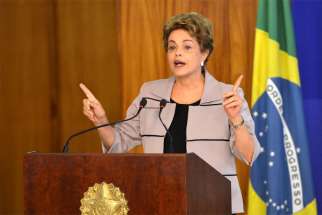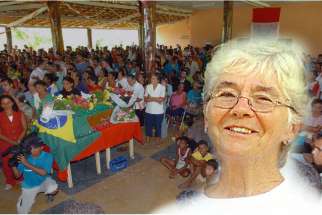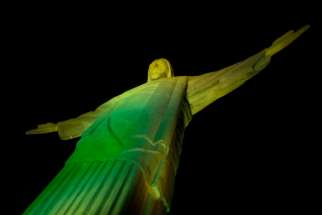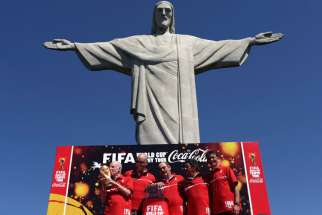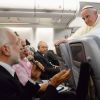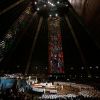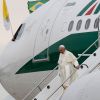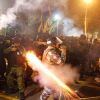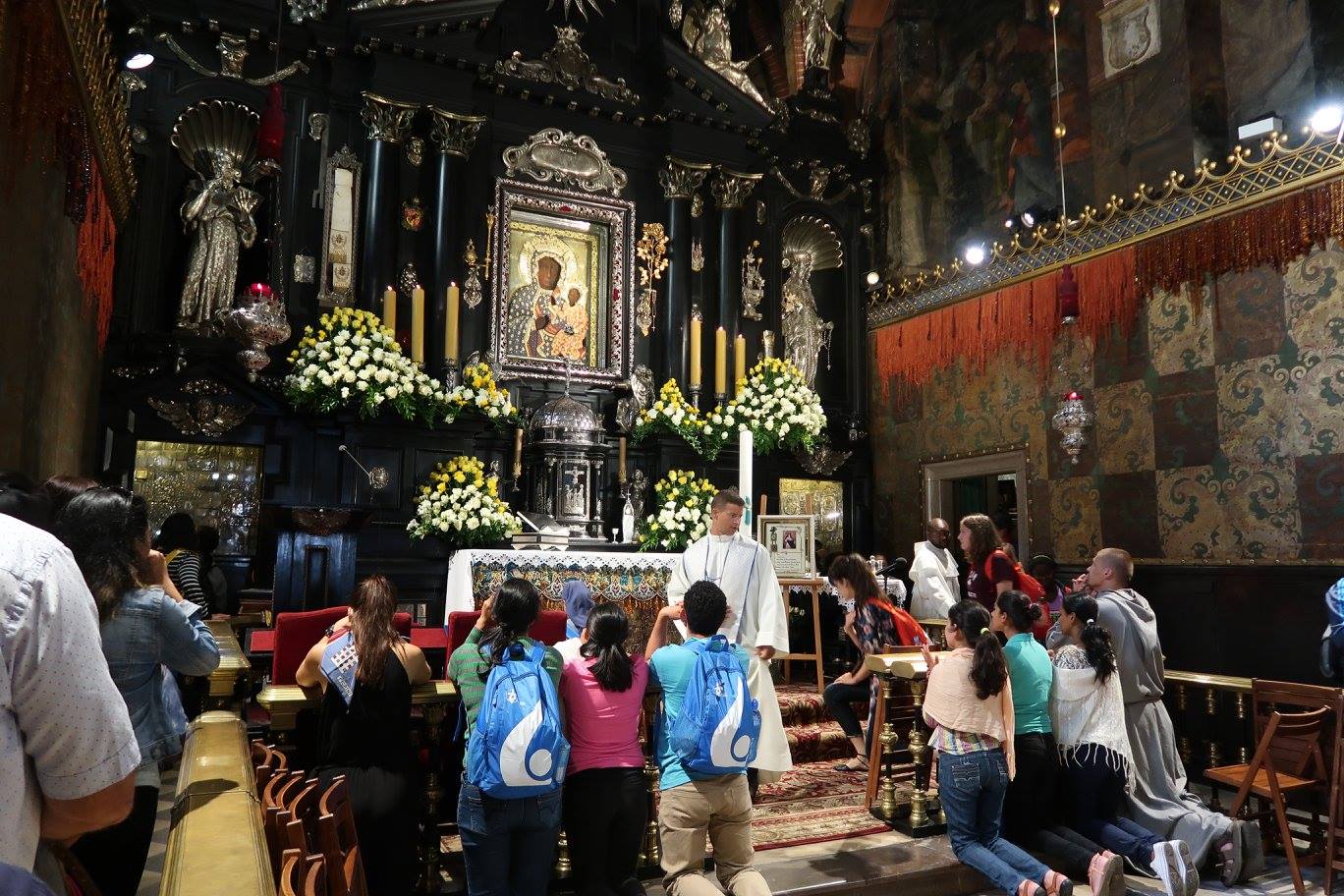SAO PAULO – Christian leaders said they felt uncomfortable that so many members of Brazil's Chamber of Deputies invoked religion as they voted to authorize an impeachment process for Brazilian President Dilma Rousseff.
Sr. Dorothy Stang died fighting for Brazil’s landless; 10 years later, not much has changed
PARA, Brazil - On Feb. 12, 2005, two hired gunmen killed Sr. Dorothy Stang, 73, as she read aloud from the Bible in a remote settlement just off the Trans-Amazonian Highway.
SAO PAULO - The Brazilian bishops' conference has given the government and 2014 FIFA World Cup organizers a "red card" for putting the competition above the Brazilian people's basic needs.
VATICAN CITY - As the World Cup was about to kick off, Pope Francis called on fans and competitors to celebrate the event as an opportunity to promote dialogue, respect and peace.
SAO PAULO - Hours before the kickoff of the 2014 FIFA World Cup, the statue of Christ the Redeemer, one of the main symbols of Brazil, was to welcome the 32 teams competing in the event with a special light and sound program.
RIO DE JANEIRO - As Brazil counts down to the opening of the World Cup on June 12, churches in cities hosting the international soccer tournament are not content to sit on the sidelines and cheer.
SAO PAULO - Less than a month from the start of the 2014 FIFA World Cup in Brazil, leaders of several religions gathered at Maracana Stadium in Rio de Janeiro to kick off what they are calling the World Peace Cup.
World Youth Day and three million dissenters
It is both proper and gratifying to see the success of World Youth Day in Rio as a massive, marvelous “yes” to Christian faith.
Pope answers questions about Curia reforms, gay lobby
ABOARD THE PAPAL FLIGHT FROM BRAZIL - Pope Francis said he was responding to the clear wishes of the College of Cardinals when he set up commissions to study the Vatican bank, Vatican financial and administrative procedures and the reform of the Roman Curia.
RIO DE JANEIRO - With the young pilgrims of World Youth Day, Pope Francis was encouraging and challenging; with the bishops, priests and religious who minister to them he was firm and blunt.
Hope and optimism
Pope Francis is the first pope from Latin America and he ensured South America was the destination for his first foreign trip. So it was no surprise that the Argentine Pope was welcomed to World Youth Day in Brazil by huge, adoring crowds who brought his motorcade to a standstill.
RIO DE JANEIRO - Hundreds of thousands of cheering people welcomed Pope Francis to Brazil July 22 as he made the first international trip of his pontificate to his native region of Latin America.
SAO PAULO - Leaders of the Brazilian bishops' conference announced their support for the massive demonstrations sweeping across South America's largest nation, but declined to say how they might affect World Youth Day activities and the visit of Pope Francis in July.
SAO PAULO, BRAZIL - A Catholic samba group in Rio de Janeiro changed its parade plans after the nightclub fire that killed more than 230 people, most of them students from the local university in Santa Maria.
TORONTO - A lot of people don't know that God is Brazilian, but Scarboro Mission priest Fr. Ron Macdonell has had 26 years of working with indigenous people in the Amazon River basin to learn just how Brazilian God can be.
"Deus é Brasileiro," is a popular saying among Brazilians.
"To me it says that the Brazilians are very close to God and God is their creator. God made them," said Macdonell.
God made Brazilians even if it's hard to say what exactly a Brazilian is. Brazilian identity is a constant puzzle that goes much deeper than soccer and samba, bikinis and coffee.
For a missionary, the question of identity is worked out in faith.
"You can be Catholic in Brazil. You can be Chinese Catholic. You can be Nigerian Catholic. You have to look at what's cultural and what isn't," said Macdonell. "Looking at Brazil, Brazil is a mishmash of all the world's cultures."
Macdonell has lived most of the last 26 years among Macuxi native people in the rainforests of the Amazon, straddling the equator.
Macdonell doesn't think of himself as a missionary to Brazil. Rather, he is a missionary with the Macuxi people. He was living with the Macuxi in the northern Brazilian state of Roraima until the Scarboro Missions called him back this year to serve on its leadership council. Though now based in Toronto, Macdonell will return to his Macuxi community a couple of times a year for extended visits.
The 54-year-old identifies himself as a child of Vatican II, but traces his vocation back to pre-Vatican Council roots in Antigonish, N.S.
"This vision of justice was one feature of the pre-Vatican Church in Nova Scotia — the Antigonish Movement, the co-op credit union movement, Moses Coady and Fr. Jimmy Tomkins. I heard about all that from my parents," he said. "Then the second experience that was formative for me was the Antigonish diocesan priests who were working in Honduras as part of the Church's call to aid Latin America. I would hear about them."
A talent for languages also en- couraged Macdonell's vocation. He isn't just fluent in English and Portuguese. He has of course learned the indigenous languages of Roraima — Macuxi and Yanumami. Japanese was fun to learn. And when he did his PhD in linguistics it just seemed more intreresting to do it in French at Université de Laval in Quebec.
In the context of the Brazilian Church, Macdonell has a very clear sense of the Second Vatican Council as a living and breathing force.
"In Brazil we have a very strong component of the Church that works along social lines and the social Gospel," he said. "Any study of the catechism is not just a call to personal conversion and learning about the Catholic faith. It is also a call to missionary involvement in the local community."
Which means he's not the only missionary when he meets with his Macuxi parishioners. They're all missionaries. The priest's job is to give them the tools and the confidence to be missionaries in their own communities, even their own families.
"So the importance of leadership training is vital. And this is with people who do not have a lot of schooling — perhaps four years of school," he said. "A lot of our work — the sisters and the other priests I work with — is to form teams that will give spiritual training in how to read and interpret the Bible."
Macdonell sees the 19th-century missionaries as driven by sheer numbers of baptisms and the establishment of new parishes. Around the Second Vatican Council the emphasis shifted to institutions — clinics, hospitals, schools, labour centres.
But today's missionaries are focussed on formation so that people can really take ownership of their faith.
"It's sort of an invisible, unmeasurable mission," he said.
There will be no neat statistics that show how confident and wise parish leaders have become. But in regions where there are few priests spread out over huge territory with many inaccessible communities, where Mass is celebrated as little as two or three times per year, lay leadership is essential.
There's more to leading an indigenous Church in Brazil than liturgies and Bible study. People expect the Church to be close to them in their lives.
"We're working with people in poverty, so we're trying to analyse what are the sources of this poverty," said Macdonell.
Whether the issue is local drinking water or rampant alcoholism tearing apart families, groups Macdonell works with expect their religion to help them live a better life. Meetings that start with prayer quickly move on to deal with health, employment and social issues.
Brazil's national conference of Catholic bishops encourages and supports the connections between societal challenges and religion with annual fraternity campaigns during Lent and some 30 pastoral commissions that work on land rights, homelessness, workers' rights, women, ecology and more.
"There's already a structure that has been created within the Brazilian Church that calls people to this engagement, so that their personal faith is lived out in some way," Macdonell said.
As he settles back into life in Canada for a while, Macdonell is aware that at 54 he's one of the younger priests in the Scarboro Missions. He also knows the hope Scarboro Missions once placed in lay missionaries who make three-year commitments has been hard to achieve, with few people able to abandon jobs, families and mortgages.
But he doesn't believe we're living through a twilight for missionary vocations.
"The Church will always produce missionaries and we look to where they are to find them," he said.
"We see people coming to Canada from Asia, from Latin America, from Africa to be missionaries here among us. Our Church is more and more universal. That's where the catholicity comes in. It's a common language."
WYD Blog
-
Call to arms
If you did not feel empowered by Pope Francis' homily during the welcoming ceremonies at World Youth Day, then you weren't really listening. The…
-
Jesus calls us here to meet him
There’s so much I could say about World Youth Day: I could probably write a short book about my experiences. There are so many…
-
Jesus I trust you
Two weeks ago I left my home in Mission, BC, about an hour outside of Vancouver, and embarked on my pilgrimage to Kraków, Poland.…





















.jpg)









.jpg)


.jpg)





.jpg)
.jpg)















.jpg)





















































.jpg)







.jpg)











